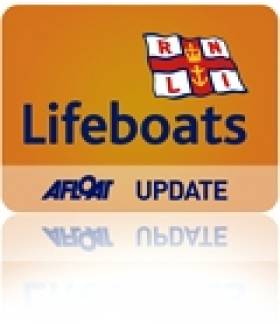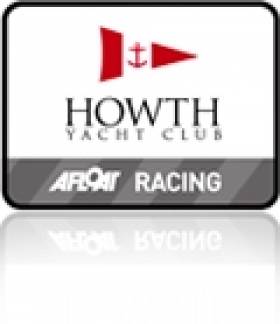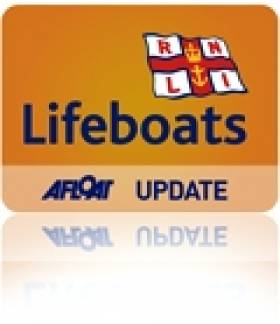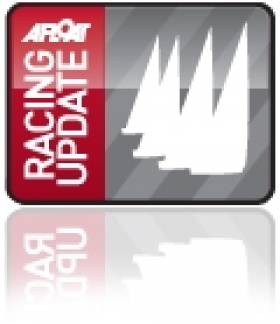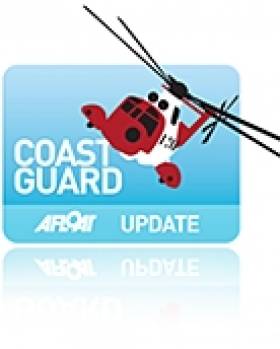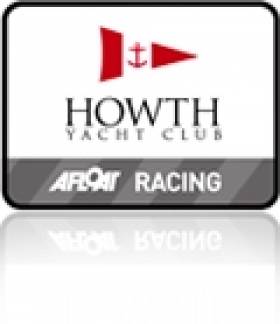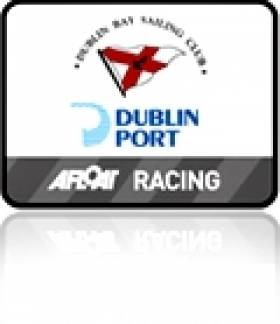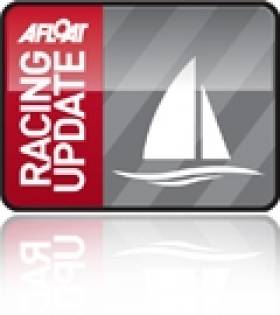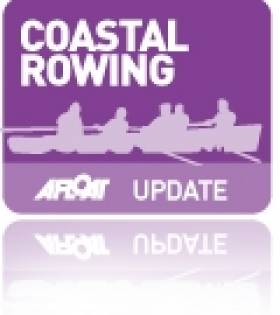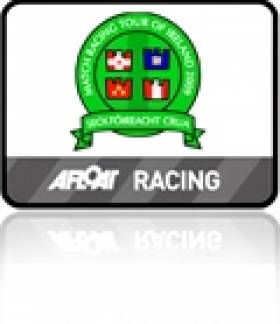Displaying items by tag: Dublin Bay
Majority of Lifejackets Fail Lifeboat Test
Over 90% of lifejackets tested at Ireland's two biggest sailing centres failed simple checks carried out by the Royal National Lifeboat Institute (RNLI) last week writes Irish Times Sailing Columnist David O'Brien.
From 91 jackets tested in Cork and Dublin, 83 failed a free inspection.
The annual Lifejacket check service carried out by the institute was only taken up by 40 sailors from an estimated 1,000 competing crews at Cork week. 35 failed the test.
In Dun Laoghaire, last Saturday the RNLI offered the service again prior to Dublin Bay racing, where the total fleet is over 300 boats, the country's biggest sailing centre. 51 from a possible 2500 lifejackets were checked. Only three were deemed ok.
There were several different reasons for the failures including rusty or out of date inflation capsules but the bulk were rejected because jackets were not fitted with crotch straps. "It is the RNLI opinion these lifejackets may not work to their full potential because they may not keep the wearer's airway above water", says the RNLI's Kevin Rahill.
It's an important point so it is a wonder how lifejackets can be sold without them. What is not explained though is why so few sailors took up the free check or why nearly half the lifejackets presented had out of date capsules?
There is little doubt there has been an increased use of lifejackets in recent years but as last weeks survey shows it's equally important to know the lifejacket you are wearing actually works if you end up in the water.
RNLI Lifejacket Checks
Crosshaven:
LJs Checked 40
Ok 5
No Crotch Strap 18
OOD Capsule 22
OOD Hammar 1
Mk 3 Head 1
Rusty Cyl 2
Slack or Cyl out 4
Fired 3
Condemned (evidence of severe damage to fabric, mechanism etc) 1
Dun Laoghaire:
LJs Checked 51
Ok 3
No Crotch Strap 30
OOD Capsule 21
OOD Hammar 9
Mk 3 Head 1
Rusty Cyl 4
Slack or Cyl out 2
Fired 1
Condemned (evidence of severe damage to fabric, mechanism etc) 5
Since this article first appeared in the Irish Times on Friday, July 27 plans are afoot to test Lifejackets again in Dun Laoghaire in August or September.
We want your view on our forum thread HERE!
Related Safety posts
RNLI Lifeboats in Ireland
Safety News
Rescue News from RNLI Lifeboats in Ireland
Coast Guard News from Ireland
Water Safety News from Ireland
Marine Casualty Investigation Board News
Marine Warnings
'Makutu' Beats 'Tantrum' in Howth
HOWTH YACHT CLUB. WEDNESDAY SERIES 3 (RACE) 28/07/2010 Class 1 IRC: 1, Makutu Doyle/Others; 2, Tantrum 3 Klimche/O'Leary; Class 1 HPH: 1, Makutu Doyle/Others; 2, Tantrum 3 Klimche/O'Leary; Class 2 IRC: 1, Dux A Gore-Grimes; 2, Superhero Burne/Banahan; 3, Toughnut D Skehan; Class 2 HPH: 1, Toughnut D Skehan; 2, Indigo Eadie/Ritchie; 3, Superhero Burne/Banahan; Class 3 IRC: 1, Alliance V Gaffney; 2, Starlet Bourke/Others; 3, Gecko K Darmody; Class 3 HPH: 1, Helly Hunter L McMurtry; 2, Rossinver C Scott; 3, Rock Lobster Delaney/Archer; White Sails HPH: 1, Savarna Burke/Curtis; 2, Sandpiper of Howth A Knowles; 3, Fanatix R Fanning; White Sails IRC: 1, Alphida H Byrne; 2, Bite the Bullet C Bermingham; 3, Force Five R & J McAllister
For the first time, the recently-formed Sea Safety team will also be on hand to offer advice to visitors on how best to prepare for trips afloat and boating activities.
Equipment demonstrations and model boat displays will also be part of the attractions including the station's All-Weather lifeboat (ALB). Crew-members, who operate on a fully-voluntary basis will be demonstrating various items of rescue equipment and the ALB " Anna Livia" will be alongside offering close-up views of this €2 million rescue craft.
There are two lifeboats at Dun Laoghaire, a Trent class ALB and a D-Class ILB (Inshore lifeboat) of the new IB1-type that was recently delivered to the 207-year old station and is based in the nearby historic boathouse at the East Pier. This lifeboat, named 'Realt Na Mara' , was funded by the genorisity of a family in Dublin. The station's shop selling souvenirs and other lifeboat-related items will also be open, helping to raise funds for the voluntary service.
The Sea Safety team, part of the RNLI's stated aim of improving safety at sea through education and information can also take bookings for the free 'Sea Check' service that assists boat-owners. The Dun Laoghaire RNLI station is one of 43 based in the Ireland division that operate 55 lifeboats that launched on 976 occasions and rescued 1,008 people in 2009.
Dun Laoghaire is regularly amongst the busiest and last year launched on 68 occasions and rescued 92 people. For more information, please visit http://www.dunlaoghaire-lifeboat.ie
Bullet for Goodbody in Medemblik
Tim Goodbody of the Royal Irish Yacht Club took a gun at day two of the OK Dinghy European Championships in Medemblik, Netherlands. The weather produced a late finish after a complete change in conditions with very unstable offwind winds mixing up the results, with most of the leading contenders picking up a high score.
Race three got underway at 13.30 in about five knots after an earlier attempt was postponed and the fleet sent ashore to wait for the wind to build. At the start much of the fleet immediately had to tack onto port as no one could cross on starboard and this was a hint of things to come.
Most of the favourites headed to the left hand side towards a big black cloud but after one third of the beat, a 60 degree shift to the right gave the other half of the fleet a massive lead over the left side. The regatta leaders Terry Curtis, Tim Goodbody and Antoni Pawlawski were all on the left and paid a heavy price for this.
Race winner Thomas Glas said, "I started in the middle of the line and then there was a big right shift. Andreas Pich (GER) led round the top mark followed by Christian Hedlund (DEN), Jurgen Illers (GER) and myself.On the last beat Christian and Andreas went to the right and were fighting together so I went left of the fleet and got a lift which took me into the lead and I won by about 50 metres." Glas rounded off an excellent day with a ninth to end the day in ninth overall
He added, "Today was really tricky sailing, especially with the big shifts in the first race."
The wind increased slightly for race four and still very shifty. The left side did pay this time with Neil Goodhead (GBR) and Martin Bower (GBR) leading round the top mark from the left corner and Alistair Deaves (NZL) in third from the right. Goodhead maintained his lead to the leeward mark and then Tim Goodbody (IRL) made his move, taking the lead at the top of the second beat from Bartosz Rakocy (POL) and Deaves with the wind now at 12-15 knots.
Goodbody extended down the run to lead to the finish. Rakocy sailed well to record another second place to the take the overall lead while Jorgen Lindhardtsen recovered from an average first beat in race four to finish third and move up to third overall. Pawel Pawlaczyk (POL) continued his consistency to end the day in second overall. Overnight leader Terry Curtis (GBR) posted a 33 and 27 in the shifty conditions to drop to 12th overall, while Goodbody also picked up a 23 in race three.
All apart from four out of the top 10 have posted high scores so far, so after Wednesday's two races, the discard should considerbly change the order at the top.
| No | Sailno | Name | Scores | R1 | R2 | R3 | R4 |
|---|---|---|---|---|---|---|---|
| 1 | POL 19 | Bartosz Rakocy | 18,0 | 2 | 10 | 4 | 2 |
| 2 | POL 14 | Pawel Pawlaczyk | 22,0 | 7 | 2 | 7 | 6 |
| 3 | DEN 1364 | Jørgen Lindhardtsen | 29,0 | 8 | 4 | 14 | 3 |
| 4 | IRL 10 | Tim Goodbody | 31,0 | 6 | 1 | 23 | 1 |
| 5 | NZL 522 | Greg Wilcox | 34,0 | 5 | 8 | 9 | 12 |
| 6 | GER 693 | Martin von Zimmermann | 41,0 | 11 | 16 | 6 | 8 |
| 7 | POL 31 | Antoni Pawlowski | 46,0 | 1 | 7 | 28 | 10 |
| 8 | GER 747 | Andreas Pich | 46,0 | 9 | 22 | 2 | 13 |
| 9 | GER 731 | Thomas Glas | 53,0 | 13 | 30 | 1 | 9 |
| 10 | GER 717 | Oliver Gronholz | 60,0 | 10 | 25 | 21 | 4 |
Howth Coastguard Work Features in 'The Irish Times'
Irish Times reporter Laurence Mackin spent a day with the Howth Coast Guard, and discovers their vital, voluntary work can be distressing as well as rewarding. His feature piece is well worth a read and is published HERE.
Oona Wins in Howth
Something Else is First in DBSC Cruisers One
CRUISERS 1 - 1. Something Else (J.Hall et al), 2. Jalapeno (Dermod Baker et al), 3. Powder Monkey (C.Moore/M.Byrne)
CRUISERS 2 - 1. Cor Baby (Keith Kiernan et al), 2. Red Rhum (J Nicholson)
CRUISERS 3 - 1. Chouskikou (R.Sheehan/R.Hickey), 2. Asterix (J.Counihan/F.Meredith), 3. Grasshopper 2 (K & J Glynn)
CRUISERS 4 - 1. Maranda (Myles Kelly), 2. Artemis (J.Giles), 3. Aslana (J.Martin/B.Mulkeen)
FIREBALL - 1. Licence to Thrill (Louis Smyth), 2. Good Thing (J.Dunne), 3. Blind Squirrel (Frank Miller)
GLEN - 1. Glenluce (D & R O'Connor), 2. Pterodactyl (R & D McCaffrey), 3. Glencorel (B.Waldock/K.Malcolm)
IDRA 14 FOOT - 1. Dunmoanin (Frank Hamilton), 2. Doody (J.Fitzgerald/J.Byrne), 3. Squalls (Stephen Harrison)
MERMAID - 1. Oonagh (J&M Griffith), 2. Kim (D Cassidy), 3. Aideen (B.Martin/D.Brennan)
PY CLASS - 1. Evan Dolan (), 2. Peter Craig (Laser), 3. Ross O'Leary (Laser)
RUFFIAN 23 - 1. Diane ll (Bruce Carswell), 2. Alias (D.Meeke/M.McCarthy), 3. Icicle (C & J Murray)
SHIPMAN - 1. Whiterock (Henry Robinson), 2. Bluefin (B.Finucane et al)
SQUIB - 1. Tais (Michael O'Connell), 2. Periguin (N.Coakley/J.Redahan)
Goodbody Second at OK Europeans
Former Olympic Finn sailor Tim Goodbody lies in second place after day one of the OK Dinghy Europeans in Medemblik. 67 sailors from 11 nations are taking part in the event. Two races were held in a solid force 3-4 with a few rain storms passing over providing some interesting wind shifts. With two third places, Terry Curtis (GBR) leads from Tim Goodbody (IRL) and Antoni Pawloski (POL)
In the first race, Pawel Pawlaczyk (POL) led round the top mark from Antoni Pawlowski (POL) and Alistair Deaves (NZL). On the final beat Pawlowski maintained his lead with Rakocy in second and Curtis climbing to third, with another Pole Marek Jarocki (POL) finding a big shift to place fourth just ahead of Deaves in fifth.
The wind increased for the second race with Dublin Bay newcomer Tim Goodbody leading from start to finish.
Racing continues until Friday 30 July.
Results after 2 races
1. Terry Curtis, GBR, 6
2. Tim Goodbody, IRL, 7
3. Antoni Pawlowski, POL, 8
4. Pawel Pawlaczyk, POL, 9
5. Bartosz Rakocy, POL, 12
6. Jorgen Lindhardtsen, DEN, 12
7. Greg Wilcox, NZL, 13
8. Rene Joahnnsen, DEN, 26
9. Robert Deaves, POL, 26
10. Bo Teglers, DEN, 27
The Race
The race will take place from the back of the marina breakwater in Dun Laoghaire harbour at 2pm on the 21st August 2010. The start lines for the teams will be positioned just below the hobbler's memorial on the breakwater. The race distance is 25 miles. The previous event lasted over three hours. There will be food and music on the day as well as a prize giving ceremony at a well known venue in Dun Laoghaire.
The event will be the last in the east coast skiff racing calendar and is a test of endurance.
The Tradition
As per local tradition, all teams will row traditional east coast skiffs comprising four oarsmen and one coxswain in wooden clinker-built boats. Present day racing skiffs reflect their traditional origins, and are twenty-five foot long, clinker built double-enders.Between the 18th and 19th centuries the hobblers of Dublin Bay invented the original rowing race. The skiffs would leave Dún Laoghaire, Ringsend and other nearby harbours to meet ships arriving into Dublin as far away as the Kish bank. The first crew to the ship would win the business of pilotage and unloading.
The Club
Contact Details: David CullenTel: 0868826189Email: [email protected]
Click this link for Irish Rowing detailsClick this link for the Latest Rowing News
World Wins Match Racing Challenge
Ireland took on the world at the weekend in the inaugural Ireland v. The World Match Racing Challenge, but it was the global alliance that came out on top in the end, with 36 wins over Ireland's 29.
Light winds kept the race count down from the anticipated 90-odd, but good conditions on Sunday meant the 66-race Round Robin was completed in Scotsman's bay.
The overall team trophy was in balance until the final few flights, but the World team did enough to edge out the Irish Challenge.
Romain Baggio and his Bordeaux Racing team sailed an impeccable series, only losing one race to Keith Swinton of Australia to take the Individual win.
The event was an experiment in many ways, with proceedings blogged flight-by-flight as they happened by on-the-water reporters. The records of the entire event can be found online at matchracing.ie/challenge, and you can replay the flights on the online GPS tracker HERE.
Live, on-the-water commentary was broadcast over channel 77 from Olympic commentator Jimmy Fitzpatrick and Olympian Ger Owens, and innovative spectator packages allowed spectators fire the gun to start racing and even sit in an on-board hotseat during racing.
Final Skipper results after 12 races each are:
Baggio (FRA) 11 wins(91%)
Nicholas (AUS) 10 wins(82%)
Cornah (GBR) 7 wins (64%)
Swinton (AUS) 8 WIns (73%) minus 1 point penalty
Elmes (IRL) 6 Wins (55%)
Sheehy (IRL) 6 Wins (55%)
O'Connell (IRL) 5 wins (45%)
Hunt (IRL) 4 wins (36%)
Fowler (IRL) 4 wins (36%)
Duncan (NZL) 3 wins (30%)
O'Leary (IRL) 3 wins (30%)
Huckstadt (GER) 0 wins (0%)



























